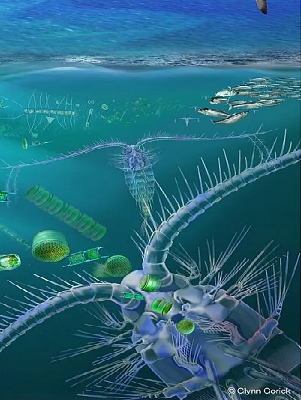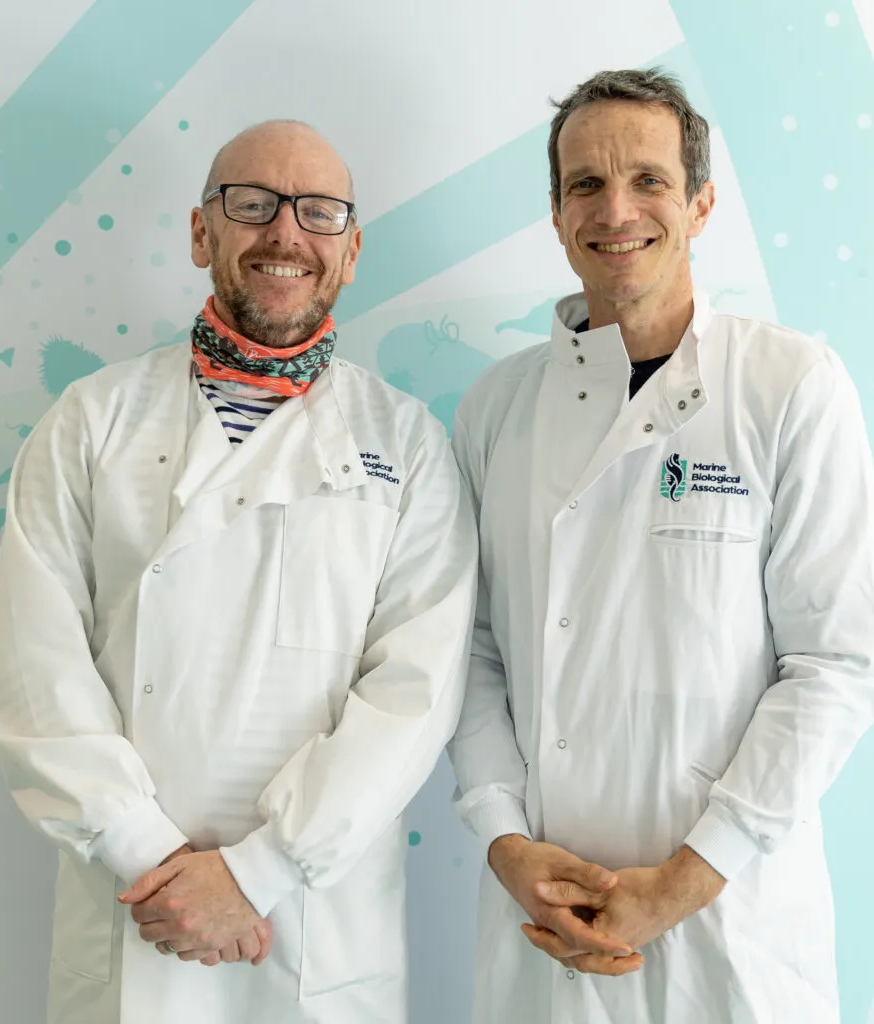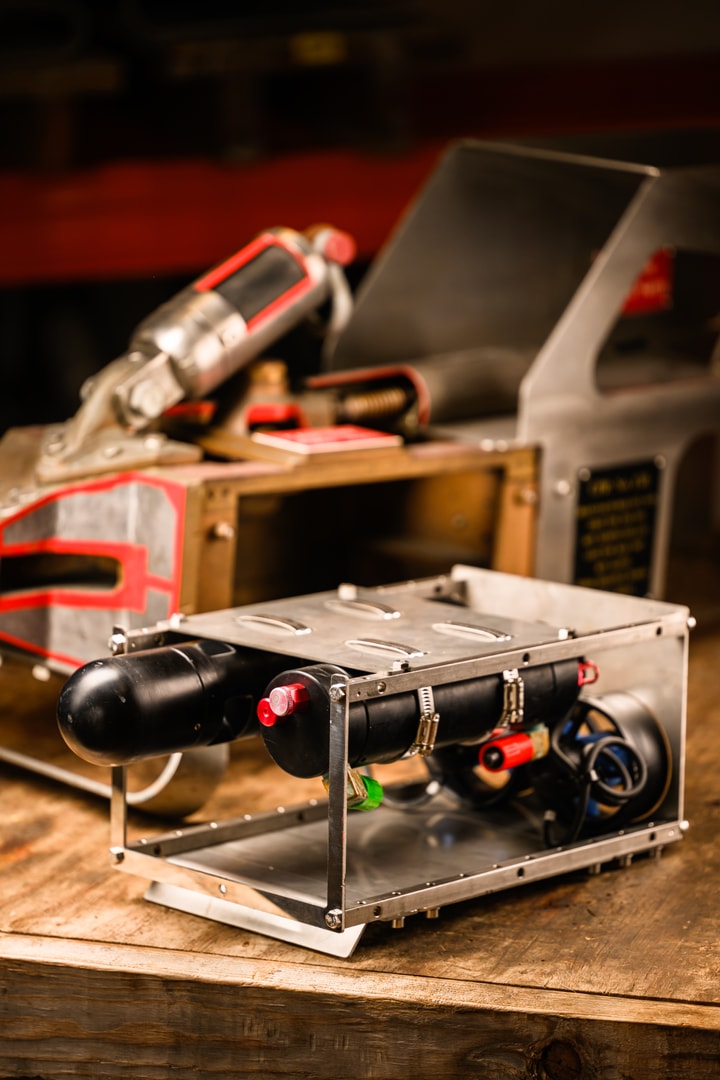News
Find out about the Continuous Plankton Recorder (CPR) Survey latest news.
Latest Tweet
Tweets by CPRSurvey

Four leading UK marine research institutions are joining forces to explore the ocean’s role in mitigating climate change.
08 Jul 2024 | 24Four leading UK marine research institu...

UN Senior Advisor visits the CPR Survey
11 Mar 2024 | 102UN Senior Advisor visits the CPR Survey...

The science of tomorrow, today
27 Feb 2024 | 182Advances in technology have enabled the...
News Archive
New study reveals link between climate change, oceanic circulation and dinoflagellates
05 Feb 2024 | 240Researchers from the Continuous Plankton Recorder (CPR) Survey based at the MBA have led a study to assess the long-term changes in dinoflagellate biomass and biodiversity to see if there is a link to large scale climate patterns and oceanic circulation in the North Atlantic.
Small but mighty – the importance of the ocean’s tiniest inhabitants
01 Feb 2024 | 80Tiny plankton – measuring less than 20µm (or 0.02mm) in diameter – make up the majority of plankton in the ocean and play a critical role in the planet’s health, according to new research. However, scientists say challenges in identifying them have led to them becoming a silent majority that is currently being overlooked when it comes to global ocean policy.
120 years of collaboration with Cefas
02 Oct 2023 | 160We recently had the pleasure of welcoming Cefas Chief Executive Neil Hornby and Cefas Chief Scientist, Professor Grant Stentiford. Cefas is a government agency under the Department for Environment, Food & Rural Affairs (Defra) in the UK. It is primarily responsible for providing scientific expertise and research to support sustainable marine and freshwater environments, fisheries management, and aquaculture. Cefas conducts research on a wide range of topics related to aquatic ecosystems, environmental monitoring, and seafood safety. It plays a critical role in advising the UK government on fisheries and environmental policies.
Vacancy: Plankton Analyst CPR Survey
22 Aug 2023 | 328Due to increasing workloads, we are looking for Plankton Analysts to work within the Continuous Plankton Recorder (CPR) Survey. These are part-time positions and once a comprehensive training programme is successfully completed, you will work as a member of a team carrying out the microscopic analysis of CPR plankton samples, and other associated tasks.
CPR Survey recognised as high priority for sustained ocean observing
14 Aug 2023 | 249A recent report published by the National Oceanography Centre (NOC) has identified the Continuous Plankton Recorder (CPR) Survey as one of the top priorities for sustained ocean observations.
BBC visits the CPR Survey to investigate impact of rising ocean temperatures
07 Aug 2023 | 159BBC Climate Editor Justin Rowlatt visited the MBA to learn about data collected from the Continuous Plankton Recorder (CPR) Survey, the longest running and most geographically extensive marine plankton sampling program in the world
BBC Countryfile visits CPR Survey to learn about ocean warming and plankton, the ‘unsung heroes’ of the sea.
01 Aug 2023 | 114With 2023 on track to be the hottest year on record, scientists are working to understand and predict how these extreme temperatures will affect marine life.
New partnership will provide technical solutions for plankton recording data
10 Jul 2023 | 168The CPR Data Infrastructure Project will enable rapid and accurate data entry, analysis, visualisation and publication using global standards for marine biological data.
Opportunity for a technical partner to create cloud-based data management and publication solution
01 May 2023 | 251Opportunity for a technical partner to create cloud-based data management and publication solution
Plankton modelling system forecasts important shifts in phenology and community composition in the North Atlantic Ocean
11 Apr 2023 | 272Significant changes in plankton abundance and seasonality due to global climate change could alter the biological carbon pump in the ocean, according to new research.
Innovative approach for analysing historical data reveals new understanding of plankton regime shifts in the North Sea
23 Mar 2023 | 224Using historical abundance data from the CPR Survey from 1958 to 2018, the team assessed plankton composition in terms of functional traits associated with regime shifts which took place in the 1980s and 1996 to 2003. One of the most intriguing results of this work was a relative lack of change in the functional traits of plankton during the 1980s regime shift, despite the clear detection of the event using a variety of other metrics. The results also showed the functional traits of plankton across the whole North Sea changed more after the 1996-2003 regime shift, compared to the 1980s shift. Previous works using different metrics indicated that the two regime shifts were events of similar importance, which differs from the results of this paper.
Continued plankton research crucial to predict the future of ocean life in a changing climate
06 Feb 2023 | 289In this study, researchers analysed key responses of zooplankton to ocean warming, shifts in phenology (study of seasonal changes in the life cycles of plants and animals from year to year), range, body size and other variables. The results revealed there are key knowledge and geographic gaps in monitoring coverage that need to be urgently addressed; and integrating modern and traditional techniques for improved plankton observation could help predict future scenarios under global changes.
Plankton could hold key for understanding link between ocean pollution and human health
05 Jan 2023 | 226Plankton may offer a way to monitor historical marine pollution trends, and could be used to predict trends in human health, according to new research.
Climate change driving changes of plankton in our ocean
15 Nov 2022 | 242Scientists have discovered that the heating up of the North Atlantic is causing plankton to shift and change in abundance, indicating a threat to the earth’s climate.
CPR Survey attends PICES North Pacific marine research meeting
31 Oct 2022 | 194Research Fellow and coordinator of the Pacific Continuous Plankton Recorder (CPR) survey, Dr Clare Ostle, represented the CPR Survey at The North Pacific Marine Science Organization (PICES) marine research meeting. Held this year in Busan, South Korea, PICES is a crucial meeting in order to share the latest in North Pacific marine research. PICES is an intergovernmental organisation whose aims are; To promote and coordinate research in the North Pacific. Advance scientific knowledge of the ocean environment, and its ecosystems and impacts. Promote the exchange of scientific research and information on these subjects. As coordinator of the Pacific CPR survey, Clare attended the meeting to present some of CPR’s recent research on potentially harmful microbes and algae found on our CPR new routes in the Bering Sea and Arctic. This important work has been carried out using molecular techniques developed by Dr Rowena Stern and Hannah Robinson, alongside regular CPR sampling. “It was great to see people again and have those face to face discussions and chats about our work that are very difficult to do online.”
Grant received to support the largest marine ecological survey in the world
18 Oct 2022 | 205The Marine Biological Association (MBA) has been awarded £400,000, which will improve its research facilities, reinforcing its position as leaders in marine science. Trustees from the Garfield Weston Foundation have awarded a grant of £400,000 towards the first phase of the refurbishment and redevelopment project at the MBA’s HQ at Citadel Hill, Plymouth.
Pioneers of plankton research: Alister Hardy; A tribute by John R Dolan
01 Jun 2022 | 286Alister Hardy is known among plankton researchers for developing and employing his Continuous Plankton Recorder (CPR). Hardy used the first version of the CPR during the 1925–1927 Discovery Expedition to the Southern Ocean. However, while the CPR is well known, many plankton researchers today are likely unfamiliar with the story of its genesis and its precursors, as well as the full breadth of Hardy’s contributions to plankton research. As the CPR studies of Hardy have received substantial attention, CPR development and the early surveys will be but briefly covered. The following account is based on both Marshall’s biographical Memoire of Hardy (Marshall, 1986) and Hardy’s articles and books.
Leading the way in laboratory sustainability; first marine biology institute in UK with LEAF accreditation.
22 Nov 2021 | 172Leading the way in laboratory sustainability; first marine biology institute in UK with LEAF accreditation.
Scientists call on COP26 leaders to listen to the ocean in order to meet climate goals
04 Nov 2021 | 162Scientists call on COP26 leaders to listen to the ocean in order to meet climate goals
Celebrating 90 years of the Continuous Plankton Recorder Survey
01 Oct 2021 | 272Celebrating 90 years of the Continuous Plankton Recorder Survey
CPR Survey goes the distance to win a Guinness World Record
31 Dec 2020 | 282Seventeen times to the moon and back – we’ve set the record for the greatest distance sampled by a marine survey!
Celebrating 60 years of CPR data
06 Jan 2020 | 226Celebrating 60 years of CPR data
The Continuous Plankton Recorder (CPR) Survey has merged with the Marine Biological Association
04 May 2018 | 692Greater synergies and influence for UK environmental science
Dr Therese Coffey, the Minister for Environment tours SAHFOS
06 Mar 2018 | 474Dr Therese Coffey, the Minister for Environment tours SAHFOS
SAHFOS Analyst attends 1st EUROBUS working group meeting
29 Jan 2018 | 477SAHFOS analyst, Martina Brunetta, attends the 1st EUROBUS working group meeting at the Stazione Zoologica Anton Dohrn of Naples, to discuss the recent European invasion of the copepod Pseudodiaptomus marinus
NASA highlights CPR Survey research - Bacteria thrive as ocean warms
29 Jan 2018 | 479SAHFOS data and research highlighted as part of NASA Image of the Day
SAHFOS Year of Plankton
22 Jan 2018 | 418What a great 12 months of plankton!
New paper published with SAHFOS PhD student as lead author
15 Jan 2018 | 407Plankton indicators show us more than just plankton
SAHFOS contributes to international plastic awareness campaign
02 Nov 2017 | 533The Ocean Plastic Lab exhibition, featuring SAHFOS and the CPR Survey is now touring the G7 countries, with the aim of increasing engagement on the issue of plastics in the world's oceans.
SAHFOS awarded funding for innovative public engagement project
16 Oct 2017 | 575Selected by NERC, the Sir Alister Hardy Foundation for Ocean Science (SAHFOS) has been chosen, as part of a new ‘BLUEPRINT' consortium, to build capacity in public engagement with environmental research across the UK.
SAHFOS ‘ocean indicator’ amongst plastic pollution monitoring tools for Round Britain eXXpedition crew
09 Aug 2017 | 667A re-modelled indicator originally used by Sir Alister Hardy to collect plankton is to be used by the all-female eXXpedition crew to collect ocean plastic pollution samples on their Round Britain voyage
Funding for first system to monitor the hidden dangers of ships ballast
03 Aug 2017 | 497Innovate UK provides funding for collaboration (including SAHFOS) to develop the first early deduction system to locate invasive non-native species and other harmful components of ships' ballast water
Impacts of marine climate change demonstrated by decade of scientific collaboration
28 Jul 2017 | 495SAHFOS contributes to a major new publication by the UK Marine Climate Change Impacts Partnership (MCCIP) which demonstrates the important effects climate change is having on UK seas and coastlines.
SAHFOS 2016 Annual Report out now!
24 Jul 2017 | 452Learn more about the wide-ranging impacts and activities completed by SAHFOS in 2016. Our latest Annual Report is now available.
SAHFOS Climate Change Researchers Put New FlowCam Macro on Trial
17 Jun 2017 | 498SAHFOS researchers are trialling the new FlowCam Macro as part of their involvement with the EU project AtlantOs.
SAHFOS to host special session on ocean observing systems at science meeting this autumn
02 Jun 2017 | 417Special session on ocean observing systems at MASTS
New study highlights the importance of long-term ecological monitoring programs
01 Jun 2017 | 739New study highlights the importance of long-term ecological monitoring programs
‘Viral dark matter’ - Hidden world of giant viruses discovered in seawater
15 May 2017 | 633The hidden world of giant viruses discovered in seawater
SAHFOS lead paper amongst most downloaded from Global Change Biology in 2016
11 Apr 2017 | 410The journal, Global Change Biology (GCB), has announced a paper, lead by SAHFOS Researcher Professor Chris Reid, was one of their most downloaded in 2016.
Local school children try their hand as marine biologists for a day in Plymouth as part of British Science Week 2017
07 Apr 2017 | 317Scientists from two of Plymouth’s leading marine science institutes host 2 days of events for children
Now on sale, SAHFOS comprehensive guide, 'Marine Plankton - A Guide to Ecology, Methodology and Taxonomy'
24 Feb 2017 | 2354.
SAHFOS advises on role of plankton amongst drivers of decline in Atlantic puffins
23 Feb 2017 | 329.
SAHFOS Director of Pacific Survey interview on Gulf Watch Alaska involvement
20 Feb 2017 | 412.
2016, another record breaking year in annual miles towed for SAHFOS
17 Feb 2017 | 411.
SAHFOS's Marianne Wootton features on Heart radio for microplastics story
16 Feb 2017 | 423.
'The Plankton Problem' - SAHFOS features on BBC World Service
14 Feb 2017 | 411.
GACS hold annual Board meeting at SAHFOS
29 Sep 2016 | 442Non-Indigenous Species identification training for SAHFOS analysts
27 Sep 2016 | 471Fertiliser role for krill in Southern Ocean
21 Sep 2016 | 543.
SAHFOS amongst 53 wildlife charities and research organisations behind State of Nature 2016 report
14 Sep 2016 | 483New international report concludes our oceans are shielding the rest of the world from the heat impacts of climate change
08 Sep 2016 | 442.
Sir Alister Hardy Foundation for Ocean Science (SAHFOS) scientists share marine expertise at Challenger Conference for Marine Science 2016 in Liverpool
08 Sep 2016 | 421.
CPR data essential in understanding herring stock variability in the North Pacific
16 Aug 2016 | 521.
50 years of Sir Alister Hardy Foundation for Ocean Science (SAHFOS) datasets contribute to international study into the climate change effect on Vibrio bacteria
10 Aug 2016 | 454.
NOAA CPR plankton samples have new home in SAHFOS archive
03 Aug 2016 | 446.
UK wildlife calendar reshuffled by climate change
08 Jul 2016 | 498Climate change is already reshuffling the UK’s wildlife calendar, and it’s likely this will continue into the future
SAHFOS adds new technology to plankton recorder fleet
13 Jun 2016 | 459.
SAHFOS launches a new look website
16 May 2016 | 530.
SAHFOS is one of the first to use new FlowCam Macro
12 May 2016 | 776.
Annual Report 2015 now available
04 Apr 2016 | 474The 2015 Annual Report is out now. As a showcase of the quantity of research, analysis and projects that have been completed, there are a number of diverse articles inside.
Climate study finds evidence of global shift in the 1980s
24 Nov 2015 | 559"We demonstrate, based on 72 long time series, that a major change took place in the world centred on 1987 that involved a step change and move to a new regime in a wide range of Earth systems," said Professor Reid.
SAHFOS appoints dynamic new Director
31 Jul 2015 | 658SAHFOS appoints dynamic new Director SAHFOS, one of the world’s most respected marine science organisations, is delighted to announce the appointment of Dr Willie Wilson as its new Director from 1st September 2015. The appointment was made after an international search and selection process.
CPR sampling in the NE Pacific: In hot water!
06 Jul 2015 | 386After several years of being cooler than average, the waters of the NE Pacific have been heating up recently. Whitney (2015) reported spring temperatures deviating 3.5 standard deviations from the long-term mean in the oceanic waters of the NE Pacific, covering the transition zone just south of where the CPR transects run.
A new study published in Nature Climate Change
03 Jun 2015 | 516When global warming rises above the dangerous threshold of 2°C, between 50 and 70% of the global ocean may experience a change in marine biodiversity.
Plymouth marine science centres scoop £1.4 million in funding awards
12 Nov 2014 | 397SAHFOS has been awarded £396,095 to equip its fleet of Continuous Plankton Recorders (CPRs) with state-of-the-art environment sensors that will measure water temperature, salinity, chlorophyll fluorescence, pH and pCO2.
Refurbishment of the CPR tow point, on-board the Bretagne.
28 Oct 2014 | 443Brittany Ferries kindly tow the CPR once a month on the Roscoff to Plymouth route. The CPR on this route is fitted with a water sampler that collects samples for DNA analysis.
2013 Annual Report now released
08 Sep 2014 | 373Our Annual Report is now available to read.
Ecological status report now online
11 Aug 2014 | 348Our Ecological status report is now available to view online.
More animal plankton after iron fertilisation?
04 Jun 2014 | 469In the wake of a controversial iron fertilisation 'experiment' off the coast of Canada, plankton scientists have noted a higher than average abundance of copepods - crustaceans that form an important food source for many marine creatures higher up food chains, including fish.
Challenger Conference for Marine Science
01 Jun 2014 | 367The Challenger Conference for Marine Science is taking place on Monday, September 08, 2014
AWI-SAHFOS Time Series Summer School on time series observations
01 Jun 2014 | 371SAHFOS together with AWI is organising a summer school on time series analysis, as a tool to assess the ecological and societal implications of climate change.
New Open Access Repository for SAHFOS Research
01 May 2014 | 337Research output from SAHFOS scientists is now available in a new open access repository, the Plymouth Marine Science Electronic Archive (PlyMSEA), which is shared by SAHFOS partners - the Marine Biological Association of the UK (MBA) and Plymouth Marine Laboratory (PML).
Climate IPCC Change 2014: Impacts, Adaptation, and Vulnerability
02 Apr 2014 | 468Members of the Intergovernmental Panel on Climate Change (IPCC) Working Group II published their first update in seven years on the scale of impacts, adaptations and vulnerabilities to climate change.

